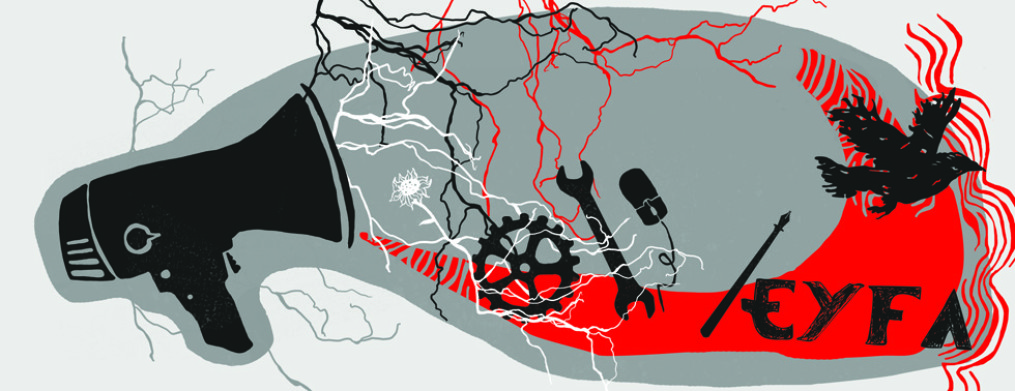Our April newsletter will catch up with you soon, we chose a rather big topic and we’re still working on it! In the meantime, here’s the May edition.
As the financial crisis continues, more and more big businesses have an ‘excuse’ to cut corners by hiring underpaid labour, or laying off workers without honouring their basic rights. In reality, rather than being a setback for the big companies, the crisis seems to be speeding up the wheels of corporate capitalism by offering an increasingly consumerist society cheaper goods in exchange for consumers turning a blind eye to ethical standards. With frustrated workers all over Europe marching in solidarity on May 1, we introduce our May newsletter .on Trade&Labour…
————————————————————————–
**Contents
*1. May Day “We won’t pay for the bankers” – France
*2. Exploitation and fear
*3. How to cut transport costs and still benefit from cheap labour – Primark, UK
*4. Materials – Textile and Wood
*5. Other links
————————————————————————————————-
1. May Day “We won’t pay for the bankers” – France
In the third protest of this kind in France in 2009, around 65,000 workers marched through Paris on May 1, with an estimated one million taking to the streets throughout the whole of France, to show their disgust with the French governments handling of the economic crisis. This year, one million more French people are likely find themselves unemployed, or with pay or time cuts, while the wealthy continue to receive large bonuses and financial advantages (e.g. tax-caps) from the system. This was mirrored in other parts of Europe, for example Germany, Greece, and Turkey, amongst others.
——————————————————————————————————
2. Exploitation and fear tactics
Trafficking, usually associated with sex and prostitution, has since also become the tool of companies needing cheap labour. However, both native and immigrant employees are increasingly being denied union rights and being forced into dangerous or illegal labour practices in the strive for lower retail prices. With no union and/or contract, companies can save money on insurances, proper safety equipment and legal salaries for workers, whilst making them work longer hours and in worse conditions.
Workers for a factory in Turkey, which produces items for many well-known western European companies (most of them reputed for their unbelievably cheap prices), are currently fighting their case, supported by the Clean Clothes Campaign. Union representatives have been repeatedly forced out, leaving remaining workers even more worried for their jobs, in turn allowing companies to take even more advantage of their welfare. In a factory where people have died by falling into machinery, with others sent in afterwards to retrieve the body, an IKEA investigation found ‘no major problems’. Support the Turkish workers by following the instructions on the Clean Clothes Campaign website (link below).
http://www.lastradainternational.org/?main=traffickinghumanbeings
http://www.cleanclothes.org/ikea-and-household-retailers-abet-union-busting
http://www.humantrafficking.change.org/blog/view/labor_trafficking_on_the_rise_in_eastern_europe
——————————————————————————————————
3. How to cut transport costs and still benefit from cheap labour – Primark, UK
UK Clothes retailer Primark have apparently managed to reduce their transportation costs by sourcing their labour from a TNS factory based in Manchester, where workers sewed clothes for 10 hours a day, for 3GBP (3Euros 50 cents), almost half the legal minimum wage. After being discovered taking advantage of the workers’ illegal status, Primark called in Border Control police, focusing negative publicity on the Indian, Pakistani and Afghan workers, subjecting them to criminal investigation, while the company continues to ignore the issue and abuse human rights in order to produce the cheapest clothes on the high street.
http://www.labourbehindthelabel.org/campaigns/primarkspin/101-campaigninfo/267-primarkuksweatshop
http://www.guardian.co.uk/business/2009/jan/11/primark-ethical-business-living
http://www.nosweat.org.uk/search/node/primark
————————————————————————————————————–
- Materials – Textile and Wood
Another way that companies can slash their expenditure, is to use cheap materials, likely to be unsustainably sourced and chemically processed. Cotton is one of the oldest examples of this; while organic fair-trade cotton exists, and has become almost mainstream (re-usuable bags being sold in supermarkets as an environmentally option), this popularity is till being capitalized upon by companies using GM produce and toxic processes, and of course exploitation of schoolchildren is rife. In some countries during the cotton harvest, school are closed and children put to work in the fields, working under the threat of risking lower grades if the headmaster doesn’t reach his quota.
http://www.moralfibre-fabrics.com/ethics_of_clothing.html
http://www.ejfoundation.org/page145.html
Green-washing is also an effective way of being allowed to use cheap material, under ‘ethical branding’. The FSC (Forest Stewardship Council) are now notorious for their ever-widening idea of ethical deforestation. The FSC started as an organization offering credible certification of environmentally and socially responsible managed forests, usually for use in household furniture or building materials. However, this has left them open to abuse by large companies using FSC ‘branded’ wood to attract customers, while their high demand pushes down FSC standards, leaving more ancient forests open to deforestation under the disguise of ecological sourcing.
Sweden is home to some of Europe’s oldest forests, but due to a decreased budget for forest protection brought in this year, these are now at risk of destruction under the cover of FSC. Paper products for the UK, USA and Germany are the greatest risk to Sweden’s forests, with nearly 2000 species of animals and plants already at risk of extinction. Read more about the Swedish fight here: http://www.fsc-watch.org/archives/2009/05/21/FSC_s__false_guarant
Also see:
http://www.protecttheforest.se/
http://www.greenpeace.org/international/press/releases/documenting-FSC-progress-03112008
. ———————————————————————————————————
Other links:
General:
http://www.ejfoundation.org/http://www.protecttheforest.se/
Design Activism- http://designactivism.net/archives/101
Short history of design ethics- http://www.moralfibre-fabrics.com/ethics_of_clothing.html
If you have any more links related to this topic in English or other languages, let us know and we’ll add them to the website..
